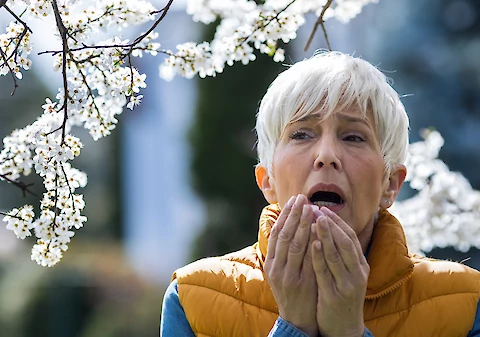
We love the beauty of springtime with its blooming flowers and sunshine. However, for many seniors, this season also brings the challenge of managing seasonal allergies. While these allergies present a nuisance, you don't need to let them stop you from enjoying the warmth and colors of spring. This guide explores common allergy triggers, shares tips for avoiding them, and provides suggestions for lifestyle changes and medication options. With the right management plan, you will breathe easier and fully appreciate the rejuvenating spirit of spring.
Common Spring Allergy Triggers
During spring, various allergens become more prevalent and may trigger allergy symptoms. Some of the most common triggers include:
- Pollen from trees, grass, and weeds: As plants grow and bloom, they release pollen into the air, which may cause allergic reactions.
- Mold spores: The increased humidity and moisture that comes with spring leads to mold growth indoors and outdoors.
- Dust mites: These microscopic creatures are commonly found in household dust and may cause allergy symptoms year-round, but even more so in spring when other allergens are also present.
- Pet dander: As pets shed their winter coats, dander becomes airborne and triggers allergies.
Tips for Avoiding Allergy Triggers
Completely avoiding allergy triggers may represent a challenge. But, implementing some preventative measures may help minimize exposure and reduce symptoms:
- Stay indoors on high pollen count days, usually during early mornings and late afternoons. Check local weather reports or pollen count websites for information.
- Keep windows closed and use air conditioning to prevent outdoor allergens from entering your home. Make sure to clean or replace air filters regularly.
- Use a dehumidifier to control indoor humidity levels, which helps prevent mold growth and reduce dust mite populations.
- Maintain a clean home by vacuuming and dusting regularly to reduce allergens.
- Bathe your pets frequently to minimize the dander they release into your home.
Lifestyle Changes for Allergy Management
Adopting a healthy lifestyle will help improve your overall well-being and better manage allergy symptoms:
- Incorporate a balanced diet rich in fruits, vegetables, whole grains, and lean proteins to support a robust immune system.
- Stay well-hydrated by drinking water throughout the day. Hydration helps thin mucus and alleviate congestion.
- Engage in regular physical activity to maintain overall health and reduce stress, which exacerbates allergy symptoms.
- Prioritize good sleep hygiene by establishing a consistent bedtime routine and creating a comfortable sleeping environment.
Medication Options for Allergy Relief
Several over-the-counter and prescription medications may help alleviate allergy symptoms:
- Antihistamines block the histamine response in your body, which help relieve itching, sneezing, and runny nose.
- Nasal corticosteroids can reduce inflammation in the nasal passages and ease congestion, itching, and sneezing.
- Decongestants help shrink swollen nasal tissues, making it easier to breathe.
- Allergy eye drops provide relief from itchy, watery eyes.
Always consult a healthcare provider before starting any new medications, as some may have side effects or interact with other medicines you're taking.
Working With Healthcare Providers
Working closely with your healthcare provider to create an effective allergy management plan is essential. Discuss your allergy symptoms and potential triggers with your healthcare provider to determine the best course of action.
In addition, seek appropriate medication and dosage guidance based on your specific needs and medical history. Consider allergy testing to identify specific allergens and create a tailored treatment plan.
And finally, explore immunotherapy options, such as allergy shots or sublingual tablets, which may help desensitize your body to allergens over time.
Senior Helpers Princeton Can Help
Managing allergies is crucial for seniors to enjoy springtime's beauty. Understanding common triggers, implementing preventative measures, and working with healthcare providers, will help you take control of your allergies and breathe easier this spring. If you or a loved one in Princeton, Plainsboro, Princeton Junction, Hopewell, Lawrenceville, or Pennington need assistance managing allergies or any other aspect of senior care, contact Senior Helpers Princeton today.